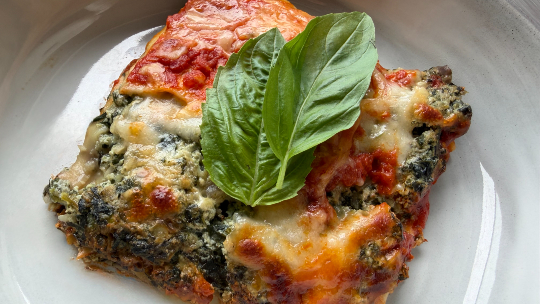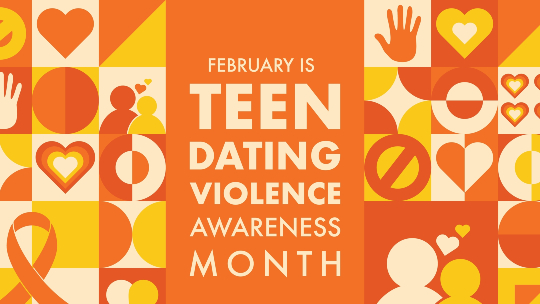Every year since 1949, Hawaii has paid tribute to Prince Jonah Kuhio Kalanianaole on his birthday, March 26. The state holiday includes a parade, hoolaulea, school programs, and other ceremonies statewide throughout the week. But who was Prince Kuhio, and what was his legacy to Native Hawaiians?
Among his many contributions was starting the Hawaiian civic club movement in 1918 to promote civic efforts, culture, and education in the Hawaiian community.
“As a child, he was among hundreds of thousands of Hawaiians,” says Ian Kealii Custino, 2024 pelekikena (president) of the Prince Kuhio Hawaiian Civic Club. “By the time he was a nonvoting member in the U.S. Congress, less than 20,000 Hawaiians were alive. So, he and other Hawaiian alii (chief) had the foresight to help Native Hawaiians survive and thrive. They took their kuleana (responsibility) to their people seriously and laid the foundation for what we see today.”
Civic club movement
Today, there are more than 60 Hawaiian civic clubs consisting of about 3,500 members throughout Hawaii and the U.S. continent, from California to Washington, D.C. that make up the Association of Hawaiian Civic Clubs.
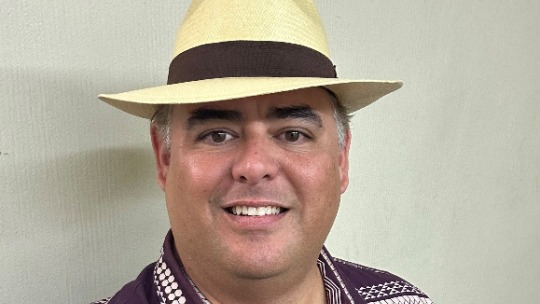
Ian Kealii Custino, 2024 pelekikena (president) of the Prince Kuhio Hawaiian Civic Club. Photo courtesy Ian Kealii Custino
Created in 1964, the Prince Kuhio Hawaiian Civic Club works to preserve and perpetuate Hawaiian values, culture, and education. The club participates in the annual Association of Hawaiian Civic Club Convention to, among other things, pass resolutions advocating for Hawaiian cultural and political rights, which are then sent to Hawaii’s congressional delegation, Legislature, and city and county councils.
“It’s wonderful and rewarding to be able to contribute with our manao (thoughts) in that way,” says longtime member Yvonne “PeeWee” Ryan.
Hawaiian traditions continue
For Ryan and her sister, Hawaiian entertainer Marlene Sai, being part of the Prince Kuhio Hawaiian Civic Club is a family tradition that included their mom and brothers Dennis and Gary. They participated in the club’s glee concerts in the 1970s to raise money for the scholarship program.
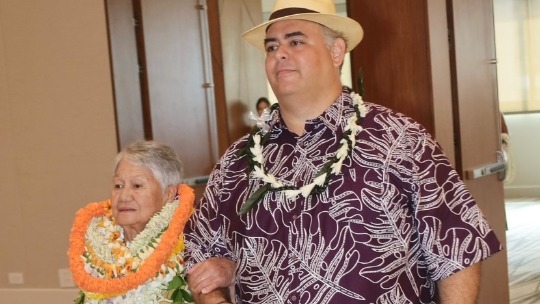
Yvonne “PeeWee” Ryan (left) was honored at the 2024 Kalanianaole Scholarship Awards Gala. Photo courtesy John Kalani Zak
“The scholarship program provides learning opportunities for students who may be unable to afford higher education,” says Sai. “It relieves them of the financial burden so they can focus on their studies rather than how to pay for school. It provides diversity and inclusion to talented young people from various backgrounds, giving them the opportunity to contribute to society.”
Over the years, the club has awarded more than $800,000 in scholarships to Hawaiians, from keiki to graduate students.
“It really empowers young people while fostering a more educated workforce and stronger community overall,” says Sai. “It’s all about aloha and helping young ones go forth.”
The scholarships these days are funded by proceeds from the club’s annual Hawaiian moon calendar sale and biennial Kalanianaole Awards Gala, which recognizes outstanding club members. Last year, the club honored Ryan and Sai for their lifelong work with the civic club and in the Hawaiian community.
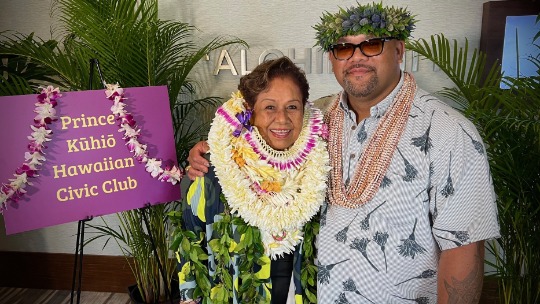
Marlene Sai (pictured here with Kuana Torres Kahele) was honored for her lifelong contributions. Photo courtesy John Kalani Zak
“We’re grateful for their ike (knowledge) and cultural resources and for contributing greatly to the Hawaiian Lahui (people) – not just as entertainers but also for their leadership roles at Kamehameha Schools,” says Custino.
Both sisters each held roles as president of the club. Sai was instrumental in leading Kamehameha School’s alumni program, and Ryan was part of the school’s investment team for almost 30 years.
Royal duties
The club will honor Prince Kuhio the entire month of March with various activities, including cleaning the chapel and grounds at Mauna Ala (Royal Mausoleum) in Nuuanu, attending Alii Sunday service at Kawaiahao Church, and supporting the Kuhio Day parade in Kapolei with the Association of Hawaiian Civic Clubs.
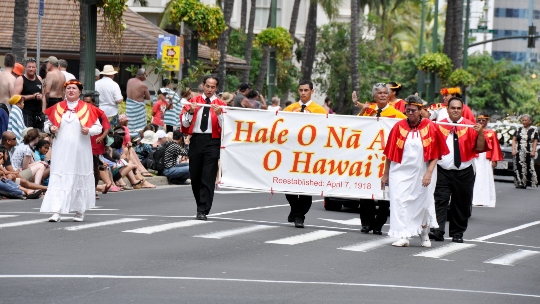
Photo courtesy Alberto Loyo
“It’s by his example that we continue to be a civically engaged Hawaiian society today,” says Custino. “We don’t do it just on Kuhio Day, but all year round. It’s a lot of work, but we do it for the betterment of Hawaiians and everybody in Hawaii.”
Looking toward the future
The club is working to grow its 180 members. They’re encouraging more young people to join by reaching them on social media and through music programs. Custino says it’s up to the younger generation to spark new energy into this timeless local tradition.
“Being in the club is like being in the company of family,” he says. ”We need events that fit keiki to kupuna and everyone in between.”
If you’re interested in joining a Hawaiian civic club, contact the Association of Hawaiian Civic Clubs.
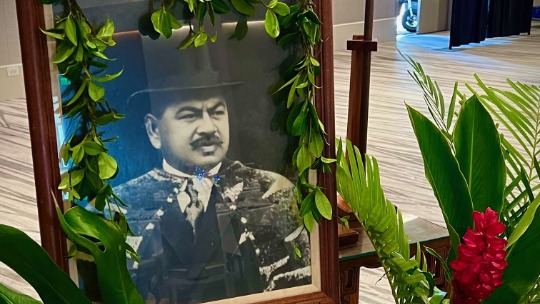
Photo courtesy John Kalani Zak
Prince Kuhio – Who da guy?
His name is more than a highway from Kahala to Waimanalo. Here are some things to know about Prince Kuhio:
- Born on March 26, 1871, in Koloa on Kauai.
- Known as Ke Alii Makaainana (Prince of the People).
- Named after both his paternal and maternal grandfathers.
- Attended St. Alban’s School (now Iolani School), where his French teacher nicknamed him “Prince Cupid” for his twinkling eyes, and Oahu College (now Punahou School).
- His uncle, King David Kalakaua, encouraged young Hawaiian royals to have a broader education and sent Kuhio to attend Saint Matthew’s School in San Mateo, Calif. and Royal Agricultural College in England.
- Participated in many sports including football, wrestling, boxing, track, baseball, paddling, surfing, and polo.
- Credited with commissioning the first six-man outrigger canoe for racing, which led to paddling’s popularity.
- In 1902, became a non-voting delegate to the U.S. in Congress, where he served for 20 years.
- Spearheaded a law that set aside 200,000 acres of land for Hawaiian homesteads.
- Died on Jan. 7, 1922, at the age of 50. He’s interred at the Royal Mausoleum (Mauna Ala) in Nuuanu.
Hero and thumbnail courtesy Marcus E. Jones
Learn more about Hawaiian culture
- celebrating roots of ko
- hawaiian legends, adventure, and the rainforest
- hula at the royal palace
- rooted in aina and culture
- mana in music
- merrie monarch celebrates hula
- musical places
- sharing hawaiian culture through kapa

